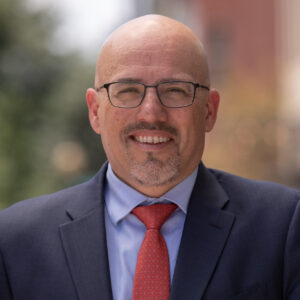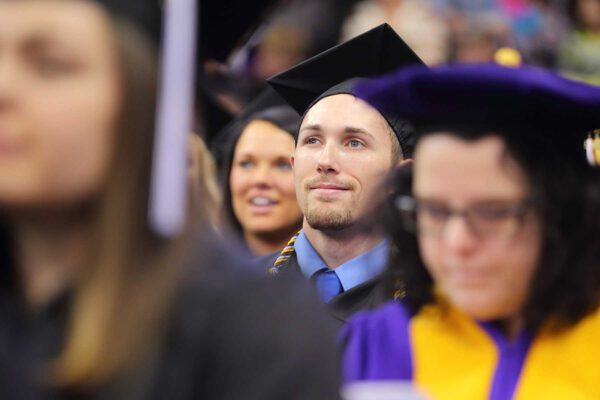By Louis Soares and Ursula Gross
The mismatch between a traditional college education and the vast number of adults who would benefit from a college degree is no small matter. There are at least 35 million adults who have some credit but no degree, and more than twice that have not even attempted postsecondary education, as we report in our new case study of the 10-year journey through regional accreditation of the non-traditional institution, College Unbound.
We’ve heard this all before, usually as the opening pitch to create more online courses or evening classes. But those typical efforts don’t serve the truly nontypical student. For example, would an evening class make it any easier for someone in prison to get their degree?
That’s not a hypothetical question for College Unbound.
 College Unbound is a relatively new, independent, nonprofit institution of higher education in Rhode Island that serves low-income working adult students who are returning to earn their first degree. It is a degree program designed around high-impact and innovative learning and student-support practices, such as first-year seminars, project-based learning, internships, and capstone projects. College Unbound offers a streamlined bachelor of arts in organizational leadership and change, which qualifies its students for a variety of occupations.
College Unbound is a relatively new, independent, nonprofit institution of higher education in Rhode Island that serves low-income working adult students who are returning to earn their first degree. It is a degree program designed around high-impact and innovative learning and student-support practices, such as first-year seminars, project-based learning, internships, and capstone projects. College Unbound offers a streamlined bachelor of arts in organizational leadership and change, which qualifies its students for a variety of occupations.
And it uses the cohort model to enhance student success–including one cohort of prisoners.
This unique blend of academic innovations is combined with a low-cost approach to campus infrastructure/instruction delivery and a board oversight role with a deep commitment to place-based poverty reduction and community development. Though College Unbound is small serving only in the hundreds of student it is showing good results: it has an 83 percent graduation rate, and 87 percent of alumni are employed full time. These results given the student demographics and its trio of academic, business and governance model innovation is what made College Unbound a really interesting case study about sector level change and regional accreditation.
College Unbound’s highly nontraditional model, however, presented regional accreditation with a challenge. Accreditation, in part, looks for familiar qualities in colleges and universities to ensure that the degree students receive is held to an equal standard as degrees from other institutions. But the very nature of what accreditation does—standardization, replication—can dampen truly innovative thinking. If an institution is doing something new, it’s by definition not going to look like a college that was founded 100 years ago, or even 20 years ago.
What accreditation promises isn’t what College Unbound delivers. With College Unbound, there is no singular campus, no predetermined course catalog, no tenured faculty. As a result, some of the most effective features of College Unbound worked against it during the accreditation process. Eventually, in September 2018, it was granted candidacy for accreditation (retroactive to April 2018), and it began receiving Title IV fund this fall semester.
Here’s what we believe and what we learned during that process about accreditation and higher education.
Higher education should be rewarded for being student driven, not just student centered. Everyone can claim to be student centered, but is the core of what you do driven by students? In traditional academic models, the college may provide systems, tools, and supports for students, but the college always remains the driver. In contrast, in College Unbound’s student-driven model, the student determines their educational plan and co-creates with faculty courses, projects, and other learning experiences to support that plan. This open design serves adult students, but presented certain problems for the accreditation process.
Let’s build college around cohorts of students instead of clusters of buildings. In College Unbound, students are grouped into cohorts for the duration of the degree program, which creates a safe and supportive environment for student success. It also allows for flexibility, so it can be implemented in settings where returning adult students can be found. These cohorts included employer-based groups at, for example, the United Way, as well as a cohort with the Prison Program, which was started in 2015 by a College Unbound alumnus, who had been formerly incarcerated, to provide the cohort academic model in correctional institutions throughout Rhode Island. College Unbound has taught anywhere from 15 to 24 credits in any one semester in the prisons, and student enrollment hovers around 80 to 100. Meeting students where they are has proved successful, but it challenges the typical thinking about what makes a campus and how effective learning environments are created.
Getting a degree should be integrated into a student’s life rather than taking them from their life. College Unbound students are already adults, so there is no need to train them to be grownups (a valuable role the typical college experience often plays). College Unbound sees adult learners as equal, valuable partners in their learning, bringing meaningful experiences and assets to the program. The program assumes intelligence in their adult learners and trusts them to be in the driver’s seat of their education. Further, the student’s work, family and community life is integrated into the curriculum, learning and assessment experience.In response, students are motivated and energized to complete their degree. But giving real value (and credit) to their experience goes against typical accreditation models.
Address educational trauma as a bridge into college learning. College Unbound students have often tried postsecondary education in more traditional settings and been traumatized by the experience. By traumatized, we mean that the experience made them feel less than and created a whole set of negative emotional reactions to college that need to be addressed as they re-engage in learning. College Unbound builds educational trauma informed instruction into instruction, programming and cohort supports.
These components of the College Unbound model stood out as innovations that made their institutional profile look different than a traditional institution but were adaptations design to support their low-income, adult learners.
Throughout the accreditation process, College Unbound had to prove that its outcomes-focused, student-driven, low-cost model was providing value. Given what we learned and the success of College Unbound, regional accreditation should consider adding innovation to its requirements. This is especially important as the need to link work and learning increases. A recent Tech Crunch article noted, “Creating clearer pathways to good first jobs by connecting school and work becomes even more critical considering that a recent survey found that 61 percent of all full-time jobs seeking entry-level employees at least on the surface ask for at least three years of experience.”
To accommodate newer education models, accrediting bodies should explore innovative models for new institutions, such as the Western Association of Schools and Colleges Senior College and University Commission’s incubation policy, which creates a formal relationship between the new institution and an accredited institution. The intent is for the new institution to evolve within the accredited institution until becoming separately accreditable. For example, College Unbound could have incubated with Southern New Hampshire University, another leader in innovative practices, while it developed the systems necessary for a stand-alone accredited institution.
Similarly, the accreditation process could offer access to peer mentors to provide advice and guidance. Eligibility, the first phase of the accreditation process, is the hardest for institutions because it takes place when they know the least and have few systems in place. A mentor could have assisted College Unbound navigate initial hurdles and provided perspective on the process.
With regard to financial aid policy, once an institution with a newer educational model has been deemed eligible to begin the accreditation process, policymakers should consider making a limited amount of “proof of concept” funds available to jump start testing of the model. This would allow for quick vetting of promising models and keep them focused on helping students succeed rather than on a fanatical pursuit for the philanthropic funding they need to sustain a 10-year accreditation journey. We may get better results for students and the system.
With still a relatively small sample size, College Unbound is showing good results: it has an 83 percent graduation rate, and 87 percent of alumni are employed full time. And while College Unbound’s blend of academic, business and governance models is unique, there are elements of each that are eminently replicable—any college or university in the United States could adapt these practices, but too few do.
Finally, the ideas of cohort size and of replicability leads us to final observation about College Unbound with regard to higher education innovation. The unit of growth for College Unbound is the manageable size cohort. As it looks to scale it would do so by creating small cohorts in different places. The uniqueness of the academic, business and governance model also belie the simplicity of a streamlined degree program, delivered in an accessible and affordable format. These are eminently replicable strategies.
Yet when we think of scaled change in higher education we tend to think of national universities serving hundreds of thousands of students, usually in online formats. College Unbound reminds us that innovation and scale may come in different packages than we expect. It is likely that part of higher education’s innovation future is the expansion of what noted scholar Bob Zemsky’s calls micromodels in his book, Checklist of Change: Making American Higher Education a Sustainable Enterprise. A micromodel is an institution whose “competitive advantage is that it is a small, compact, noncapital intensive that is developing and testing alternate modes of instruction and, because it is a narrowly focused institution, is providing the value of implementing a noticeably different business model. It will likely succeed in doing things differently precisely because it will not be saddled with the propensity to constantly add new programs or degrees…”(p. 124)
College Unbound has many lessons to offer all stakeholders to better understand innovation and regional accreditation. As important, however, is the need to deeply understand the learners, especially when they are adults from all different backgrounds and circumstances, that an institution is serving and have the freedom to create academic, business and governance models that serves them.
If you have any questions or comments about this blog post, please contact us.



